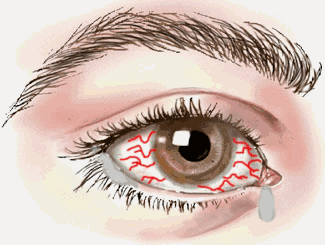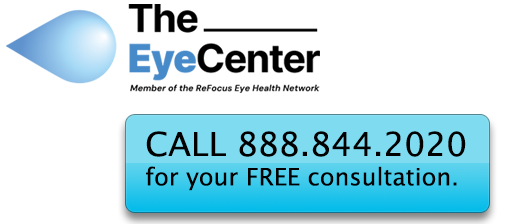Allergies
Ocular Allergies: Overview
Printable Version (PDF)
Allergies affecting the eye are fairly common. The most common allergies are those related to pollen, particularly when the weather is warm and dry. Allergies that affect the eyes can also be related to pet dander, cosmetics, daily chemicals and even the foods we eat.
Symptoms
Symptoms can include redness, itching, tearing, burning, stinging, and watery discharge, although they are not usually severe enough to require medical attention.Allergies caused by the eye coming in contact with airborne allergens are:
- Hayfever conjunctivitis: a seasonal allergy that occurs when airborne allergens such as ragweed come in contact with the eyes and cause redness, watering, and itching.
- Vernal keratoconjunctivitis: also a seasonal allergy that affects outside edges of the cornea and is most often seen in children.
- Atopic keratoconjunctivitis: a chronic, ongoing allergy response affecting the outside edges of the cornea in older patients. If untreated, it can cause scarring in the eyes
Treatment
Antihistamine decongestant eyedrops can effectively reduce these symptoms, as does rain and cooler weather, which decreases the amount of pollen in the air.
Many allergy symptoms are temporary and can be eliminated once contact with the offending cosmetic or detergent has ended.
An increasing number of eye allergy cases are related to medications and contact lens wear. Also, animal hair and certain cosmetics, such as mascara, face creams, and eyebrow pencil can cause allergies that affect the eye. Touching or rubbing eyes after handling nail polish, soaps, or chemicals may cause an allergic reaction. Some people have sensitivity to lip-gloss and eye makeup.
If you experience continued irritations from your contact lenses, you may need to change your lens prescription and in the short term stop wearing the lenses to allow your eyes to heal. Stricter lens cleaning habits may be necessary to keep airborne and chemical allergens from entering your eyes when the contacts are handled.
The types of chemical eye allergies can be categorized as either anaphylactoid (IgE mediated), which is a very sudden and intense reaction, or toxic/irritative reaction causing long-term redness and itching. In the case of an anaphylactoid reaction, emergency medical treatment is necessary. Flush the eye(s) out with water and/or a saline solution (artificial tears) as soon as possible to help remove the offending substance.
Precautions
Do not use eyedrops if you have glaucoma or if you currently have an eye infection. Eyedrops can aggravate the condition and lengthen the healing time.
This educational material is provided by Dialog Medical.
© Copyright 2005 Dialog Medical
All Rights Reserved
The Eye Center
Call Toll Free 1.888.844.2020


